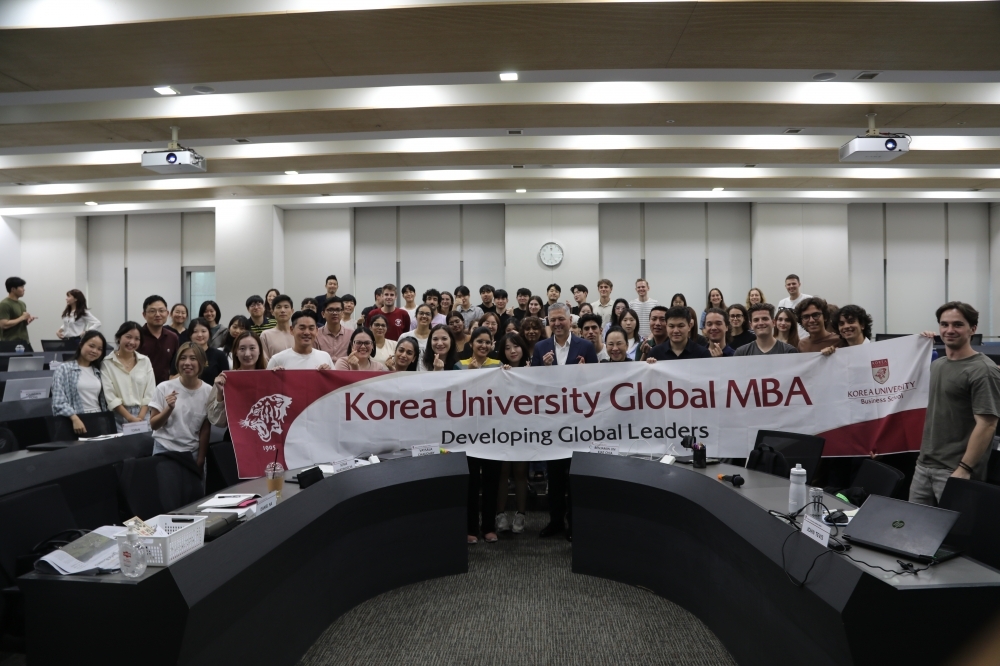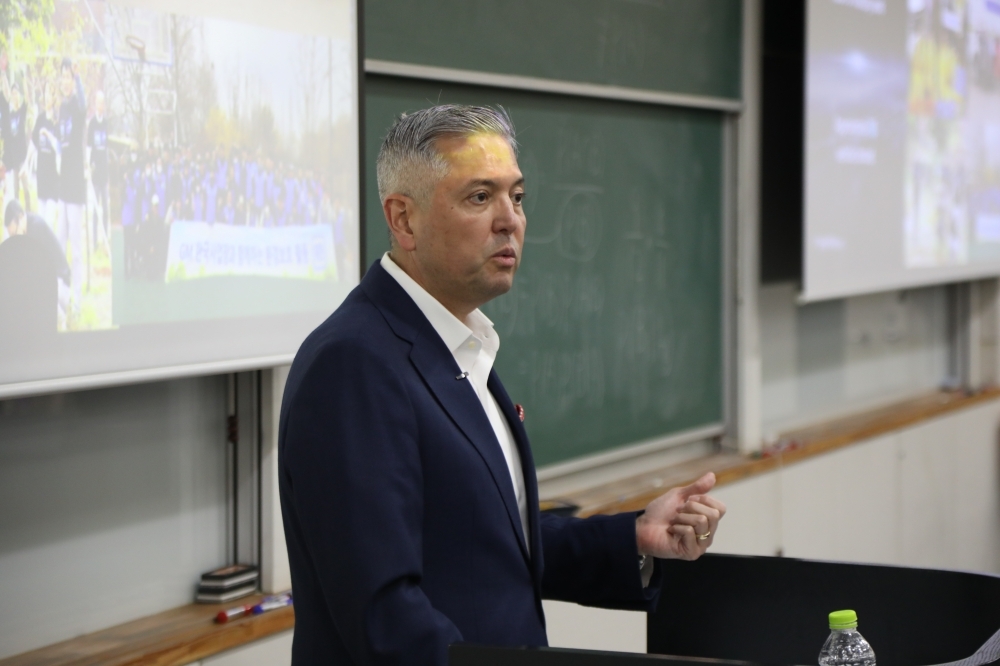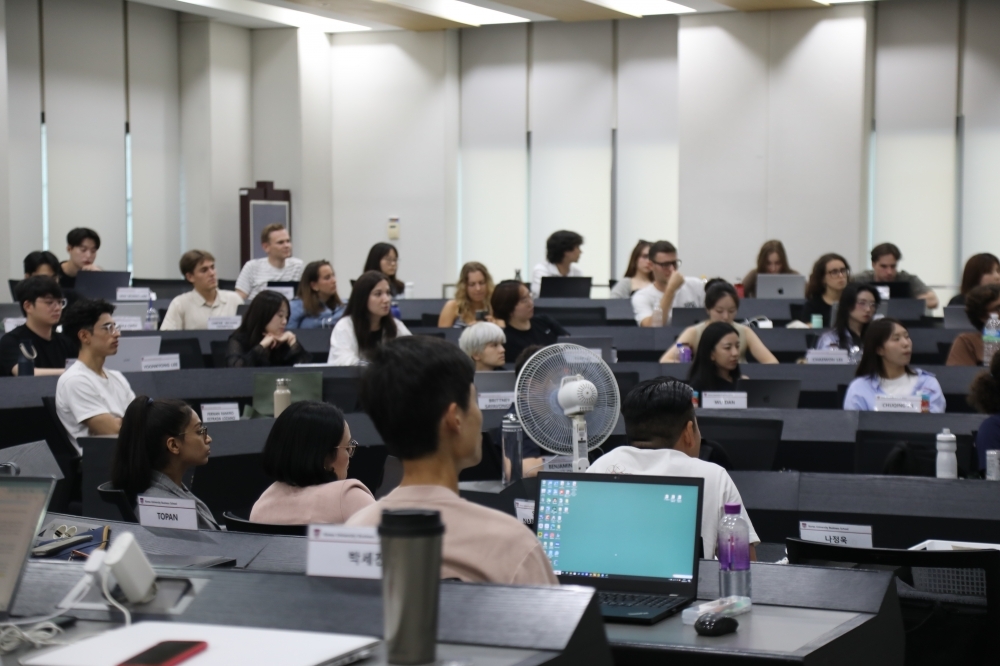News
Special Lecture
[Global CEO Talk] “You own your career. You need to know what you want to do. Don’t let anyone else
2024.10.21 Views 1359 홍보팀
[Global CEO Talk] “You own your career. You need to know what you want to do.
Don’t let anyone else decide for you,” said Hector Villareal
On September 10th, at Korea University Business School, the Global CEO Talk featured Hector Villareal, GM Korea’s CEO. Hector has worked at GM for 30 years, starting as a mechanical engineer and eventually becoming the CEO of GM Korea. He attended the same university in Mexico, the Tecnologico de Monterrey, as the presenting GMBA student. Over the years, he has gained international experience working in the United States, Russia, Uzbekistan, Thailand, and South Korea. His experience across these diverse countries helped him understand the importance of being recognized and respected both inside and outside the company and how to best evaluate efficiency in his current role in Korea.

When asked what kind of leader and CEO he sees himself as, Villareal described himself as a servant leader who looks after the team. He expects team members to know their roles, understand when and why they fail, and learn from their mistakes. Once they recognize their errors, they must fix them and move forward. Villareal expressed his commitment to working alongside his team to find solutions and share in successes when appropriate. Although he started as a mechanical engineer and later became a CEO, he acknowledged that everyone faces growing pains and challenges throughout their professional careers. Learning a new side of the business is an essential part of that process.
During the session, Villareal played a video from GM’s global CEO, Mary Barra. The short advertisement emphasized that safety is GM’s core principle, highlighting the company’s commitment to building vehicles to the same safety standards worldwide. GM also launched an initiative called “Global Safety Week,” which further underscores the importance of safety, both in the workplace and in daily operations. Safety, as Villareal noted, is a concern that extends throughout GM’s global operations.
Following this, Villareal outlined his purpose for the event: to discuss not just his personal vision but the broader vision GM has for the world. A second video showcased GM’s progress, future goals, and commitments. Two of the central pillars of GM Korea’s future are safety and innovation. Villareal highlighted developments such as self-driving vehicles, in-car health-check systems, and connectivity tools. Among these innovations is a device designed to connect and detect to avoid crashes, as well as GM’s dedicated company, Cruise, which focuses on autonomous vehicles.

Villareal stated that “The best way to predict the future is to create it,” and this philosophy drives GM Korea’s major commitment to becoming carbon neutral. In response to the growing environmental challenges, such as natural disasters and the endangerment of species, GM is shifting from combustion engine vehicles to electric vehicles (EVs). When asked about the environmental cost of EVs, particularly the use of lithium batteries, Villareal assured that GM is committed to responsible practices wherever they operate, working closely with partners like LG Energy Solution, Samsung SDI, and Posco Future M to minimize negative environmental impacts.
As part of GM’s innovation strategy, they have also partnered with Microsoft for software development in cars. However, the production of autonomous vehicles presents a significant challenge in terms of gathering necessary data without violating privacy laws. Villareal stressed that this issue must be addressed in collaboration with governments to advance autonomous driving technologies.
Despite GM Korea’s ambitious goals, Villareal acknowledged that entering the Korean market as a foreign firm presents unique challenges. Even though GM acquired a local company, skilled engineers, and built three factories in Korea, they still face difficulties, especially with safety regulations. GM, for instance, has been unable to import brands like Corvette due to regulatory barriers. Villareal also pointed out that for South Korea to continue thriving, the market needs to open further. While chaebols dominate the market, GM is positioning itself to compete in areas like safety where it can offer a distinct advantage.
Though the Korean automotive market is tough, Villareal sees many advantages, including the country’s strategic location, strong logistics network, and proximity to other key markets in Asia. These factors, he believes, will continue to position GM Korea for future growth.

Hector Villareal’s long career at GM, culminating in his current role as CEO of GM Korea, highlights his focus on servant leadership and global experience. Throughout the talk, he emphasized GM’s commitment to safety, innovation, and environmental responsibility, including the transition to electric and autonomous vehicles. Despite the challenges GM faces in the Korean market, Villareal is optimistic about the future, seeing strategic opportunities in Korea’s geographical location and logistics capabilities.
This event provided valuable lessons on the importance of adaptability in professional careers, particularly for those working in different countries and industries. Villareal’s insights will continue to resonate with GMBA and GMIM students as they pursue their own paths in management and leadership roles. His emphasis on understanding the specific needs, motivations, and expectations of local consumers, along with a commitment to corporate social responsibility and environmental, social, and governance (ESG) initiatives, will be essential for future leaders.


